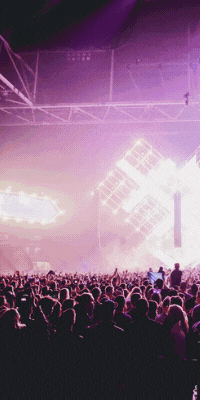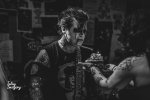MNZ Interview: Capital BS 005: Toby Lloyd – Tiny Triumph Recordings

Capital BS, live to you from our Capital City, Toby Lloyd of Tiny Triumph Recordings chats to us about All-Blacks, gentrification and demo-itis:
Tell us a bit about Tiny Triumph, your role within it, how it came about and everything like that!
I worked in the film industry, and at Park Road Production for close to a decade and the whole time I was working there on the Hobbit films and everything like that I was still producing artists and bands. I ended up getting to a crossroads where I had to decide where my priorities lay, whether it was producing music or mixing film.
I ended up jumping out of film and running the Massey commercial studios, the new ones that they built there for a couple of years. I became the head engineer there and during that time I realised just how prohibitive those large studios are for most bands. I was fortunate enough to work with like Shapeshifter and Hollie Smith and Salmonella Dub and all these incredible artists - but I found that the average three piece Wellington indie band just could not afford those sorts of rates and that was the stuff that I really enjoyed. I didn’t enjoy so much just turning up and hitting record on a really cool band, I preferred being involved in the development of the artist and really properly producing them, which I've been doing for about 15 years.
So my studio was born because of that basically, I saw that in Wellington a lot of artists couldn’t afford the big studios, but if they didn’t go to the big studios then they couldn’t get the quality that you go to big studios for.
I built my studio with the best gear money can buy but did it in a really small footprint so the artists that I work with don’t have to pay a huge amount of money for studio time. It’s done in a way where we can get world class results but using a smaller room rather than a large traditional recording studio room.
Every single day I get bands reaching out wanting to turn up and just record for a day or an hour or whatever but that’s not the way that my studio runs. It’s there as a facility for me to produce them and I only use it to produce artists from. I think that makes my studio a little different to a lot of the other studios around town.
What were the deciding factors in deciding on pursuing music over film?
Well, I still do film. I still mix scores occasionally. The last score I mixed was Savage. The deciding factors were basically that I didn’t become an engineer or a producer because I loved film. I really enjoy film, I mean, working at Park Road I got to mean George Lucas, I got to meet Josh Homme, it was a crazy place. A really inspirational place. Some of my work mates mixed Jurassic Park and Titanic and stuff like that. But at the end of the day it wasn’t music.Someone writes a script for a film and they have a vision for what they want that film to be and then they get a producer who has a vision of what they want that film to be and then they hire a director and the director has a vision of what they want the film to be and then they hire a casting director and so on and so forth and by the time it comes out it doesn’t really feel like it’s anybody’s vision it feels like it’s a vision by committee.
The thing that I love about music is that I can listen to a Jeff Buckley song and you can just hear his soul, you know? You can hear that it actually really means something to them, and that’s something that I really care about as an artist and as a producer. Working with people who really care about what they’re doing, and you can feel it.

You’d say you’re quite involved in the Wellington music scene?
Oh absolutely, yeah, Wellington is home. I think I’ve been really fortunate to work with a lot of up and coming Wellington acts. It’s a really vibrant scene in Wellington at the moment, there’s so much cool music and so many of my favourite bands are playing at the moment.
I definitely feel like I’m kind of part of the scene. Even though I’m kind of in a weird position, because I work in my studio every single day it means that I don’t get out to shows as much as I’d like. I definitely make an effort to get out to gigs when it’s an artist that I’ve produced, especially like an album release show.
But to me the most important thing is every day that I show up to work, I'm giving the artist that I'm working with the best version of myself. I definitely find that if I go out to shows then I turn up to the studio a little bit hazy and you know. I feel an intense sense of responsibility towards the artists that I work with so it’s really important to me that I turn up to the studio excited and energetic.
What role do you think recording studios such as yours play in supporting NZ music?
I think it’s really really vital. A lot of bands that I work with go down the route of trying to do it themselves. Which is great, it’s so cool that we’re in a day and age where they can do that and should try and do that. But inevitably what happens is that a lot of bands end up reaching a feeling sonically, when they’re comparing themselves to bands that they love from overseas, that oftentimes their production is less wanting.
It’s usually because, to make great quality art in this field, it takes ten thousand hours, it really does. It’s kind of the equivalent of someone wanting to be an All Black but they only play touch rugby once a month after a few beers with their mates at the beach. The quality of music production is so high these days! When you listen to the Lorde’s of the world, they sound amazing. Back in the day when people used to release music on CD it didn’t matter as much if the quality maybe wasn’t up to par because people would listen to a CD and then take it out, there was no direct comparison between artists.
These days though, with everything being playlisted so you’re literally jumping from [insert local band here] to Kings of Leon. A consequence of that is when people listen to music and it doesn’t sound great, they immediately assume that it isn’t a great song, which obviously is not the case.
So that’s where the importance of studios lies. It’s not necessarily the building or the gear it’s the fact that a lot of people that have been running studios have been doing it for 15 20 years and they know that pointing a microphone one inch in a different direction is going to give you a completely different sound.
The other thing that I think is really important about studios like mine is it means that when an artist turns up to make their music all they have to worry about is turning up and performing. They don’t have to worry about the technical, they literally just turn up, play their music and then they get to go home and I carry on working on it. It’s a very different experience than having to research what equipment you need to buy and then trying to put mattresses up against the walls, trying to run cables, wondering why they aren’t sounding right. All of those things that really have nothing to do with making music. I mean, most people got into music because they wanted to be storytellers, not run cables.
In terms of music the music you produce, is it mostly Wellington bands that you’re involved with?
Mostly. I work with bands from all around the country but I’d definitely say the majority are from Wellington. Part of that is just the word-of-mouth nature of how the industry works here. I’ll work on one record and then they go and tell their musician friends, it’s kind of a snowball effect. But I definitely work with artists from overseas as well.
How does the mixing process happen for you?
When I’m mixing I don’t actually like mixing with people in the room because in order to get a really high quality mix you need to get really deep into the music and sometimes that means going into a bit of a weird space. I might be literally looping one word over and over again to get just one syllable right. So as a musician sitting at the back of the room hearing me loop drums for like 10 minutes it can often not be fun.
I’ve got insane patience and I think that came from working in the film industry where you’d literally be working on one line of dialogue for an hour. There’s so much nuance to creating high quality music. Anyone can get a song to about 90% but it’s the final 10% that you’re shooting for, even the final 2%. That’s where the battle is needed. Definitely as a musician when you’ve been working out every song, every guitar part they might not realise the really minute things because they’ve been living with it for so long.
That’s what they call demo-itis.
Demo-itis is when a band record a demo and they get so fixated on the demo because that’s what they get used to listening to. And so every time the song progresses and you change it, it can be a bit weird for them because people don’t like change.
What do you think has changed over time in the recording industry/with recording studios?
They’re definitely different, a lot of that is due to the gentrification of Wellington. Most studios have kind of had to close down because of how expensive rent has gotten for the buildings that they used to lease. There was nowhere else for them to go. The commercial studios that remain a lot of the time are forced to do a lot of advertising and commercial work because that’s what pays the bills. And then on the flipside, technology has gotten a lot better so people can kind of record themselves and get really decent results considering.
The thing that’s different about Wellington than perhaps most other cities is the fact that Wellington lives and dies by its live scene. It’s not like the pop industry of Auckland where a lot of solo artists can produce themselves at home, making tracks in Ableton and putting them out. Wellington really is a city of bands - a city of live music. That’s the sad thing because studios have closed down and now that the money has gone out of the industry a little bit a lot of bands, a lot of the quality of the recorded stuff has suffered because you can’t professionally produce a band in your garage as easily as you can a pop artist where you just need a microphone and a laptop. In that regard recording studios are still really important. So that’s where things have changed. Sad for the Wellington band scene because we’ve got some of the best live music in the world.
Other Interviews By bethany_rachell
 Captain Festus McBoyle's Travellin' Variety Show - MNZ Interview: Capital BS 008: Captain Festus McBoyle
Captain Festus McBoyle's Travellin' Variety Show - MNZ Interview: Capital BS 008: Captain Festus McBoyle
06 Dec 2021 // by bethany_rachell
For volume 8 of Capital BS, Beth caught up with Captain Festus McBoyle about his new radio show Shipwreck Sunday. Bonus content includes: the history of the band name Buzzcocks, the benefits of theatre performance in NZ and some really positive and wholesome take-aways from Covid (yes, they do exist)!
Read More...
05 Nov 2021 // by bethany_rachell
This month Beth caught up with Kelly Wright – head of Homegrown PR – about festivals, gender diversity and our NZ music family.Homegrown 2021 - Wellington WaterfrontPhoto credit: Brady DyerCould you give us a quick synopsis of Homegrown and what it means to you?
Read More...
02 Jul 2021 // by bethany_rachell
Capital BS caught up with Nigel Mauchline from The Stomach in Palmerston North about opportunities, loud amps and the benefits of not selling booze... Tell us a bit about Creative Sounds and your job within it...
Read More...
02 Jun 2021 // by bethany_rachell
Capital BS caught up with the crew from Beagle Radio about niche radio genres, passionate music and that one band...With input from:Kim Townsend, Jamie Haigh, David Fleig, Eursula Hicks, and Damian Pullen.
Read More...
02 Jun 2021 // by bethany_rachell
Over a sweet soy flat white in downtown Wellington, Beth had a chat with Harri Robinson about art projects gone right, bankruptcy and vibrant creative scenes...Tell us a bit about Radioactive and your role within the radio station...
Read More...
02 Jun 2021 // by bethany_rachell
Capital BS caught up with James Meharry from RDU about rave-culture, the 90's and music that needs to be heard... Tell us a bit about RDU and your role within the radio station...
Read More...
 MNZ Interview: Capital BS 001: Bianca Bailey from Wiri Donna
MNZ Interview: Capital BS 001: Bianca Bailey from Wiri Donna
04 Apr 2021 // by bethany_rachell
Introducing the first of many new interview series for Muzic.net.
Read More...
 Bad Hagrid Newsletter Interview
Bad Hagrid Newsletter Interview
25 Jan 2021 // by bethany_rachell
On a sunny summer evening in the capital, local band Bad Hagrid played a set in the Wellington Botanical Gardens as part of the Gardens Magic series. The series is always an exciting time in the city and it's shown in the crowd.
Read More...
Most Viewed Artists
Latest Galleries
NZ Top 10 Singles
- APT.
ROSÉ And Bruno Mars - DIE WITH A SMILE
Lady Gaga And Bruno Mars - BIRDS OF A FEATHER
Billie Eilish - TASTE
Sabrina Carpenter - I LOVE YOU, I'M SORRY
Gracie Abrams - ESPRESSO
Sabrina Carpenter - SAILOR SONG
Gigi Perez - LOSE CONTROL
Teddy Swims - A BAR SONG (TIPSY)
Shaboozey - GOOD LUCK, BABE!
Chappell Roan








 Report A Problem
Report A Problem

